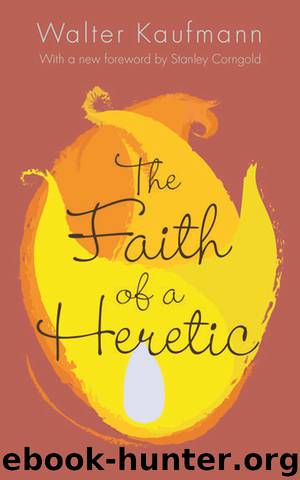The Faith of a Heretic by Corngold Stanley Kaufmann Walter A

Author:Corngold, Stanley, Kaufmann, Walter A.
Language: eng
Format: epub
Publisher: Princeton University Press
Published: 2015-08-31T16:00:00+00:00
54
The quintessence of this higher law was condensed into a classical sentence by the prophet Micah, in the eighth century B.C.: “He has told you, man, what is good and what the Lord requires of you: only to do justice, to love mercy, and to walk humbly with your God.” (6:8). Amos and Hosea had made much the same points, insisting passionately on their social implications.
Unlike most representatives of religion in other civilizations, the prophets were not concerned about religious ritual. Their demands and their social criticism were moral. Indeed, the concern about ritual was one of the things they persistently denounced in the name of the overriding importance of social justice. Micah introduces his bold summary of what God demands with four rhetorical questions: “With what shall I come before the Lord, and bow myself before God on high? Shall I come before him with burnt offerings, with calves a year old? Will the Lord be pleased with thousands of rams, with ten thousands of rivers of oil? Shall I give my first born for my transgression, the fruit of my body for the sin of my soul?” And then, as a bold antithesis, he proclaims the words cited above. What is wanted is not any ritual at all, but justice, mercy, and humility.
Amos, a little earlier, had been, if possible, still more explicit: “I hate, I despise your feasts, and I take no delight in your solemn assemblies. Even though you offer me your burnt offerings and cereal offerings, I will not accept them, and the peace offerings of your fatted beasts I will not look upon. Take away from me the noise of your songs; to the melody of your harps I will not listen. But let justice roll down like waters, and righteousness like an everflowing stream” (5:21 ff.).
In the name of him “who made the Pleiades and Orion, and turns deep darkness into the morning, and darkens the day into night, who calls for the waters of the sea and pours them out upon the surface of the earth, the Lord is his name,” Amos denounces those who “trample upon the poor and take from him exactions of wheat” and those “who afflict the righteous, who take a bribe, and turn aside the needy” (5:8 ff.).
Isaiah, Micah’s great contemporary, cries out:
What to me is the multitude of your sacrifices?
says the Lord;
I have had enough of burnt offerings of rams
and the fat of fed beasts;
I do not delight in the blood of bulls,
or of lambs, or of he-goats.
When you come to appear before me,
who requires of you this trampling of my courts?
Bring no more vain offerings;
incense is an abomination to me….
Wash yourselves; make yourselves clean;
remove the evil of your doings from before my eyes;
cease to do evil,
learn to do good;
seek justice,
abolish oppression;
defend the orphan,
plead for the widow. (Chapter 1)
The kings, too, are judged by the same standards, and no man, however admired, is exempt from judgment by the standards of this higher law. Indeed, the Old Testament goes out of its way to emphasize that the greatest national heroes had their faults.
Download
This site does not store any files on its server. We only index and link to content provided by other sites. Please contact the content providers to delete copyright contents if any and email us, we'll remove relevant links or contents immediately.
The remains of the day by Kazuo Ishiguro(8961)
Tools of Titans by Timothy Ferriss(8359)
Giovanni's Room by James Baldwin(7313)
The Black Swan by Nassim Nicholas Taleb(7097)
Inner Engineering: A Yogi's Guide to Joy by Sadhguru(6782)
The Way of Zen by Alan W. Watts(6589)
Asking the Right Questions: A Guide to Critical Thinking by M. Neil Browne & Stuart M. Keeley(5751)
The Power of Now: A Guide to Spiritual Enlightenment by Eckhart Tolle(5741)
The Six Wives Of Henry VIII (WOMEN IN HISTORY) by Fraser Antonia(5493)
Astrophysics for People in a Hurry by Neil DeGrasse Tyson(5172)
Housekeeping by Marilynne Robinson(4433)
12 Rules for Life by Jordan B. Peterson(4298)
Double Down (Diary of a Wimpy Kid Book 11) by Jeff Kinney(4257)
The Ethical Slut by Janet W. Hardy(4235)
Skin in the Game by Nassim Nicholas Taleb(4232)
Ikigai by Héctor García & Francesc Miralles(4228)
The Art of Happiness by The Dalai Lama(4118)
Skin in the Game: Hidden Asymmetries in Daily Life by Nassim Nicholas Taleb(3986)
Walking by Henry David Thoreau(3948)
